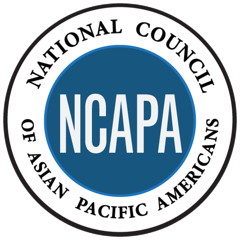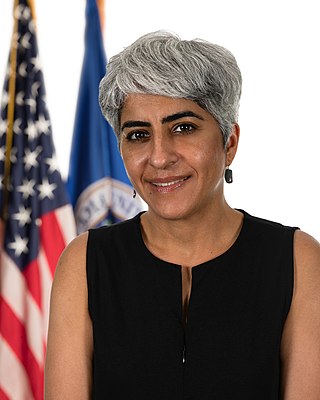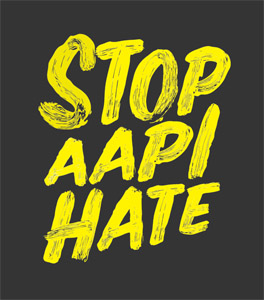
OCA-Asian Pacific American Advocates is a non-profit organization founded in 1973, whose stated mission is to advance the social, political, and economic well-being of Asian Americans and Pacific Islanders (AAPIs) in the United States.

The Audre Lorde Project is a Brooklyn, New York–based organization for LGBTQ people of color. The organization concentrates on community organizing and radical nonviolent activism around progressive issues within New York City, especially relating to LGBTQ communities, AIDS and HIV activism, pro-immigrant activism, prison reform and organizing among youth of color. It is named for the lesbian-feminist poet and activist Audre Lorde and was founded in 1994.

The National Council of Asian Pacific Americans (NCAPA) is a coalition of 35 national Asian-Pacific American organizations in the United States. Founded in 1996 and based in Washington D.C., NCAPA seeks to expand the influence of Asian-Pacific Americans in the legislative and legal arenas, and enhance the public's and mass media's awareness and sensitivity to Asian-Pacific American concerns.

Asian/Pacific American (APA) or Asian/Pacific Islander (API) or Asian American and Pacific Islanders (AAPI) or Asian American and Native Hawaiians/Pacific Islander (AANHPI) is a term sometimes used in the United States when including both Asian and Pacific Islander Americans.
Asian Americans Advancing Justice Southern California (AJSOCAL) formerly known as Asian Americans Advancing Justice Los Angeles (Advancing Justice LA), is a non-profit legal aid and civil rights organization dedicated to advocacy, providing legal services and education and building coalitions on behalf of the Asian Americans, Native Hawaiian, and Pacific Islander (NHPI) communities. AJSOCAL was founded in 1983 as the Asian Pacific American Legal Center (APALC).
The National Asian Pacific Center on Aging (NAPCA) was founded in 1979 and is a Seattle, Washington-based non-profit and American advocacy and service organization for elderly Asian Americans and Pacific Islanders (AAPI).
The Asian American and Pacific Islander Policy Research Consortium (AAPIPRC) focuses on critical policy issues facing the Asian American and Pacific Islander communities. Conceived of as part of the White House Executive Order 13515 (2009) the consortium supports, promotes, and conducts applied social science and policy research. In addition, Professor Paul M. Ong proposed two courses of action for AAPIPRC, one which formalizes working relationships among university-based AAPI research institutions and the other which would include publishing the proceedings of the briefs to inform policy.

The White House Initiative on Asian Americans, Native Hawaiians, and Pacific Islanders (WHIAANHPI) is a United States governmental office that coordinates an ambitious whole-of-government approach to advance equity, justice, and opportunity for Asian Americans, Native Hawaiians, and Pacific Islanders. The Initiative collaborates with the Deputy Assistant to the President and AA and NHPI Senior Liaison, White House Office of Public Engagement and designated federal departments and agencies to advance equity, justice, and opportunity for AA and NHPIs in the areas of economic development, education, health and human services, housing, environment, arts, agriculture, labor and employment, transportation, justice, veterans affairs, and community development.
This is a timeline of notable events in the history of non-heterosexual conforming people of Asian and Pacific Islander ancestry, who may identify as LGBTIQGNC, men who have sex with men, or related culturally-specific identities. This timeline includes events both in Asia and the Pacific Islands and in the global Asian and Pacific Islander diaspora, as the histories are very deeply linked. Please note: this is a very incomplete timeline, notably lacking LGBTQ-specific items from the 1800s to 1970s, and should not be used as a research resource until additional material is added.
The National Queer Asian Pacific Islander Alliance (NQAPIA) is an American federation of Asian American, South Asian, Southeast Asian. and Pacific Islander LGBTQ organizations. NQAPIA was formed in 2007, as an outgrowth of the LGBT APA Roundtable working groups at the 2005 National Gay Lesbian Task Force Creating Change Conference in Oakland, California. NQAPIA seeks to build the capacity of local LGBT AAPI organizations, invigorate grassroots organizing, develop leadership, and challenge homophobia, racism, and anti-immigrant bias. The organization "focuses on grass-roots organizing and leadership development."
GAPIMNY is an all-volunteer-run organization that provides a range of social, educational, and cultural programming for queer and transgender people who are Asian and/or Pacific Islander in the New York City metropolitan area to support each other. The organization's community building efforts is intricately tied to political education and mutual aid.
Shivana Jorawar is an American lawyer, reproductive justice advocate, and community organizer. She is of Asian-American Indo-Caribbean heritage.

Kiran Arjandas Ahuja is an American attorney and activist who served as the director of the United States Office of Personnel Management (OPM). She served as the chief of staff to the OPM director from 2015 to 2017. She assumed that position after serving for six years as the director of the White House Initiative on Asian Americans and Pacific Islanders. An Indian-born American, she has also been a lawyer with the United States Department of Justice and a founding director of a non-profit, the National Asian Pacific American Women's Forum. In 2017, she became the CEO of Philanthropy Northwest.

Loretta J. Ross is an American academic, feminist, and activist who advocates for reproductive justice, especially among women of color. As an activist, Ross has written on reproductive justice activism and the history of African American women.
The SisterSong Women of Color Reproductive Justice Collective, also known as SisterSong, is a national activist organization dedicated to reproductive justice for women of color.

Bo Thao-Urabe is a social entrepreneur who has founded numerous organizations and efforts to advance social justice. She was appointed as a Regent to the University of Minnesota by Governor Walz in 2021. A sought after leader, Thao-Urabe has served community in local, state and national settings and is the founder and former Executive Director of the Coalition of Asian American Leaders. President Obama appointed Thao-Urabe as a Commissioner to the President’s White House Initiative on Asian Americans and Pacific Islanders. She has also served as Senior Director at Asian Americans/Pacific Islanders in Philanthropy (AAPIP). She founded and served as the Chief Operating Officer of RedGreen Rivers, a social enterprise which develops and connects women artisans in Southeast Asia to global markets. Philanthropically, she founded of the BMPP Giving Circle, which brings Asian American families together to pool their resources together to fund social justice causes in the Upper Midwest. She has received numerous awards and recognitions, including the prestigious Bush Fellowship from the Bush Foundation in 2019. Both Saint Paul Mayor Coleman and Governor Mark Dayton declared November 1 as Bo Thao-Urabe Day.
For the Hong Kong actress and singer, see Miriam Yeung.

The AAPI Victory Fund is a Political Action Committee that focuses on mobilizing Asian American and Pacific Islanders (AAPI) eligible voters and supports Democrat AAPI candidates.

Stop AAPI Hate is a nonprofit organization that runs the Stop AAPI Hate Reporting Center, which tracks self-reported incidents of hate and discrimination against Asian Americans and Pacific Islanders (AAPI) in the United States. The organization was formed in 2020 in response to racist attacks on the Asian community as a result of the COVID-19 pandemic. Stop AAPI Hate’s approach centered on four strategies:
- Data & Research,
- Policy & Advocacy,
- Community Capacity Building
- Narrative Change
The Asian American Foundation (TAAF) is an American foundation founded in 2021 by a group of prominent Asian Americans and Pacific Islanders, aiming to support an array of Asian American and Pacific Islander causes and create a national infrastructure for a community that has faced an increasing number of racial attacks. Launched with $250 million, TAAF is described by organizers as the largest-ever philanthropic effort to support the AAPI community in history. The founders include Joe Tsai, Joseph Bae, Li Lu, Peng Zhao, Sheila Lirio Marcelo, Jerry Yang, Angela Chao and Jonathan Greenblatt. Its Founding Advisory Council members include Daniel Dae Kim, Lisa Ling, Condoleezza Rice, Jeremy Lin and more. The organization is chaired by Li Lu, and Norman Chen is the Chief Executive Officer (CEO).










